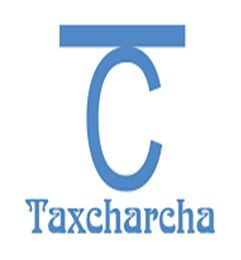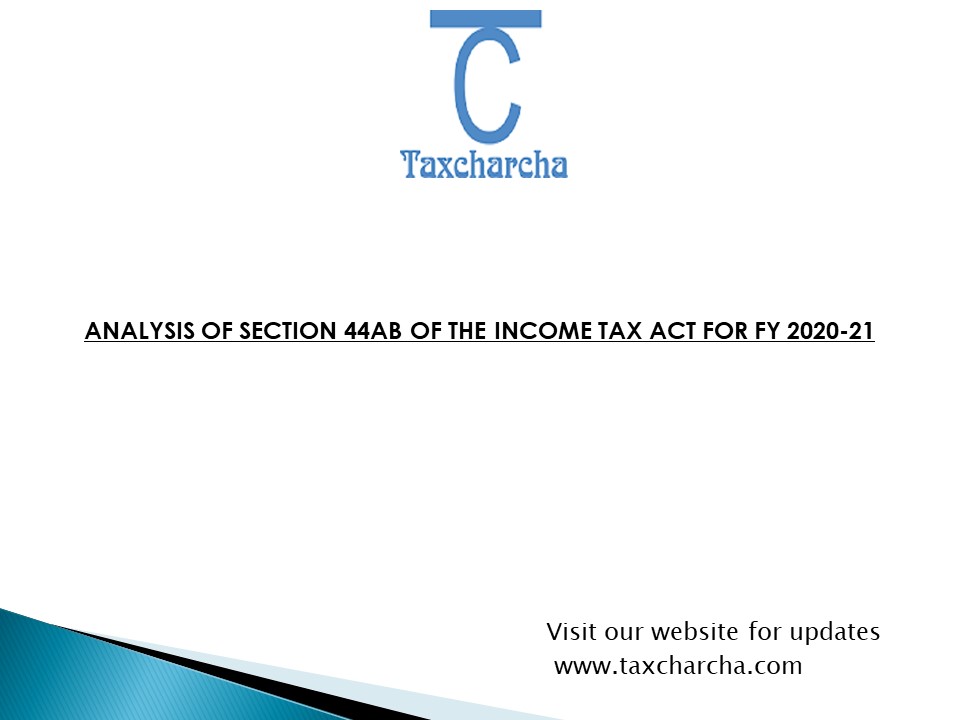Introduction
Section 44AB of the Income tax act requires the assessee to get his accounts audited from a Chartered Accountant if any of the following conditions are satisfied. The conditions are as follows:-
- In the case of business, if the total sales, turnover or gross receipts exceed Rs. 1 Crore during the previous year; there are exception to the limit of Rs. 1 Crore which has been increased to Rs. 5 Crores in Finance Act 2020 and Rs. 10 Crores in Finance Act 2021, the exceptions of which are as follows:-
- Aggregate of all amount received including amount received for sales, turnover or gross receipts during the previous year, in cash, does not exceed 5% of the said amount; and
- Aggregate of all payments made including the amount incurred for expenditure, in cash, during the previous year does not exceed 5% of the said payment,
- In the case of profession, if the gross receipt in the profession exceeds Rs. 50 Lakhs in the previous year
- In the case of business being assessed under section 44AE or section 44BB or 44BBB, the assessee has claimed the income lower than the profit or gains so deemed to be the profit and gains from the business in the previous year
- In the case of profession, if the profit and gains from the profession is deemed to be assessed as per section 44ADA and the assessee has claimed the profit and gains lower than the deemed profit of the said section
- If the assessee has opted out of the provisions of section 44AD during the previous year
If the assessee meet any of the aforesaid conditions, then the assessee shall be required to get his Books of accounts audited under section 44AB and furnish the Tax Audit report within the specified due date time limit. There are 3 forms specified in Rule 6G which are as follows:-
Form 3CA – Audit report under section 44AB of the Income tax act in a case where the accounts of the business or profession of a person have been audited under any other law
Form 3CB – Audit report under section 44AB of the Income tax act in a case of a person referred to in clause (b) of sub rule (1) of Rule 6G
Form 3CD – Statement of particulars required to be furnished under section 44AB of the Income Tax Act, 1961
There are certain other points which are deemed necessary to be considered;
- If the Books of Accounts are required to be audited under any other law and the same has been audited under any law, then it shall be sufficient compliance with the provisions of this section if such person gets the accounts of such business or profession audited under such law before the specified date and furnishes by that date the report of the audit as required under such other law and a further report by an accountant in the form prescribed under this section.
- The provisions of this section do not apply to the persons who declare their profits in accordance with section 44AD(1)
Calculation of Threshold Limit
Now, there are many questions which shall arise while computing the eligibility for the Books of Accounts to be audited with respect to the turnover and other criteria. We shall be discussing the same in a chronological manner to remove the ambiguities of the same.
- Computing the limit of Rs. 10 Crores as the threshold limit
In the Finance Act 2020, a proviso has been introduced in the clause (a) which states that the limit of Rs. 1 Crore shall be increased to Rs. 5 Crores and further Rs. 10 Crores in the Finance Act 2021. For this benefit, there are 2 conditions which needs to be fulfilled which are as follows:-
- Aggregate of all the receipts in cash shall not exceed 5% of the total amount; and
- Aggregate of all the payments in cash shall not exceed 5% of the total payments.
It is pertinent to note that in the exceptions, the word “and” has been used which says that for availing this benefit, both the conditions need to be fulfilled i.e. for availing this benefit, the cash receipts should be below the limit of 5% of the total receipts and the cash payments should be below the limit of 5% of the total payments.
In the exception, the word aggregate of all the receipts and all the payments have been used. Lets understand this concept.
- Cash receipt = Capital receipts including loans and advances + Revenue receipts – Receipts which have been received through non cash mode i.e. banking channel.
- Cash payment = Capital payments including loans and advances + Revenue payments – Payments which have been made through non cash mode i.e. banking channel.
Thus, from the above equations, it can be easily understood in the simplest manner.
| Case | Cash receipts > 5% of total receipts | Cash payments > 5% of total payments | Tax Audit applicable |
| 1 | Yes | Yes | Applicable |
| 2 | Yes | No | Applicable |
| 3 | No | No | Not applicable |
| 4 | No | Yes | Applicable |
Thus, it can be said that the for getting exempted from the tax audit requirement, the cash receipts and cash payment shall fall below 5% of total receipts and total payments simultaneously.
It is also pertinent to note that the figure of cash receipt and cash payment shall include the amount received and amount paid during the previous year whether it belongs to the year preceding the previous year. The law states the aggregate of the receipts and payments received and paid during the previous year.
- GST should be included in the turnover to ascertain the limit
While calculating the limit of Rs. 10 Crores, the GST shall also be included along with the turnover / sales as it has been mentioned in section 145A(ii) that for the purpose of computing the income chargeable under PGBP, the value of purchase and sale of goods or services and of inventory shall be adjusted to include the value of tax, duty, cess or fee, actually incurred by the assessee to bring the goods or services to the place of its location and conditions as on the date of valuation. Therefore, the value of GST collected shall be included in the figure of sales to compute the turnover for the purpose of Tax Audit.
Lets understand the aforesaid points with the help of examples:-
Illustration 1 – Turnover – Rs. 7 Crores, Total Receipts – Rs. 6 Crores, Cash receipts – Rs. 35 Lakhs, Total payments – Rs. 5 Crores, Cash payments – Rs. 20 Lakhs
Solution – Check whether cash receipt exceeds 5% of Total receipts
5% of total receipts – 5% of Rs. 6 Crores = Rs. 30 Lakhs. In this case the cash receipts exceed the 5% of total receipts.
Check whether cash payment exceeds 5% of Total payments
5% of total payments – 5% of Rs. 5 Crores – Rs. 25 Lakhs. In this case the cash payment does not exceed the 5% of total payments.
Therefore, in this case, the Tax Audit shall be applicable.
Illustration 2 – Turnover – Rs. 7 Crores, Total Receipts – Rs. 6 Crores, Cash receipts – Rs. 29 Lakhs, Total payments – Rs. 5 Crores, Cash payments – Rs. 20 Lakhs
Solution – Check whether cash receipt exceeds 5% of Total receipts
5% of total receipts – 5% of Rs. 6 Crores = Rs. 29 Lakhs. In this case the cash receipts does not exceed the 5% of total receipts.
Check whether cash payment exceeds 5% of Total payments
5% of total payments – 5% of Rs. 5 Crores – Rs. 25 Lakhs. In this case the cash payment does not exceed the 5% of total payments.
Therefore, in this case, the Tax Audit shall not be applicable.
Failure to get the Accounts audited
If the eligible person fails to get his accounts audited, then there shall be a penalty which shall be levied by the Assessing Officer under section 271B which says the following:-
Lower of
- A sum equal to 0.5% of total sales, turnover or gross receipts in the business or the gross receipts of profession.
- 1,50,000/-
In view of section 273B, there shall be no penalty to be levied under section 271B if there has been a reasonable cause with respect to the failure to get the accounts audited. With respect to the “reasonable cause”, there might be the following cases:-
- Natural calamities like earthquakes, floods, etc.
- Events beyond the control of the assessee i.e. loss of records of books of accounts
The onus of proving the reasonable cause shall be binding on the assessee.

